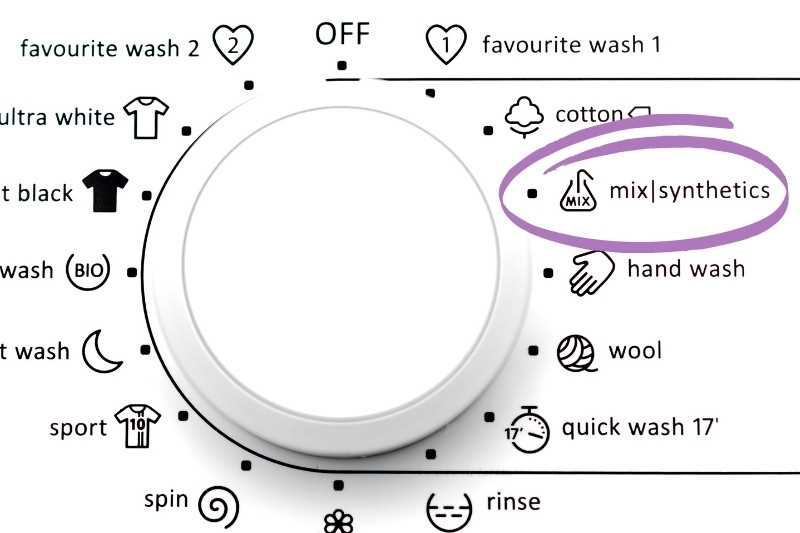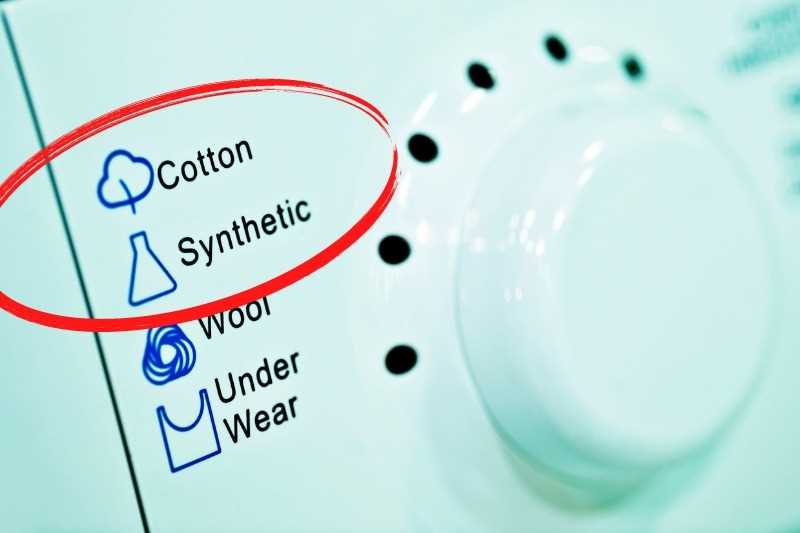




When it comes to doing laundry, most of us rely on the convenience of washing machines. These modern appliances have become an integral part of our lives, helping us to keep our clothes clean and fresh. But have you ever wondered how these machines actually work?
One important aspect of washing machines is their ability to handle synthetic fabrics. Synthetic materials, such as polyester and nylon, have become increasingly popular in clothing and household items due to their durability and affordability. However, these materials require special care during the washing process to ensure their longevity.
That’s where synthetic wash programmes come in. These specially designed settings on washing machines are specifically tailored to the needs of synthetic fabrics. But what makes them different from regular wash programmes?
The science behind synthetic wash programmes lies in the understanding of the properties of synthetic fabrics. Unlike natural fibers like cotton or wool, synthetics are made from man-made materials that behave differently when exposed to water and detergent.
The Science Behind Synthetic Wash Programmes: Understanding the Process

Synthetic wash programmes are designed to effectively and safely clean synthetic fabrics, such as polyester, nylon, and acrylic. Understanding the science behind these wash programmes can help you optimize their use and get the best results for your clothes.
How Synthetic Wash Programmes Work

The main goal of a synthetic wash programme is to remove dirt, stains, and odours from synthetic fabrics while minimizing damage to the fibers. These programmes typically involve several key steps:
- Pre-treating: Before the main wash cycle begins, some synthetic wash programmes have a pre-treatment phase where stains and heavily soiled areas are treated with a targeted stain remover or detergent.
- Washing: The washing phase involves agitating the clothes in a mixture of water and detergent. The detergent helps to break down and lift dirt and stains from the fabrics.
- Rinsing: After the washing phase, the clothes are rinsed with clean water to remove any remaining detergent and dirt particles.
- Spin Drying: The final step of a synthetic wash programme is the spin drying phase. This step removes excess water from the clothes by spinning them at high speeds.
The Role of Detergents

Detergents play a crucial role in the effectiveness of synthetic wash programmes. They contain surfactants, which are compounds that help to loosen and remove dirt and stains from fabrics.
When you select a synthetic wash programme, it’s important to choose a detergent specifically formulated for synthetic fabrics. These detergents often contain ingredients that help to preserve the integrity and color of synthetic fibers while effectively removing dirt and stains.
Temperature Control

Most washing machines with synthetic wash programmes allow you to select the temperature for the wash cycle. It’s important to follow the care instructions on your clothing labels and select the appropriate wash temperature.
In general, lower temperatures, such as 30°C or 40°C, are suitable for most synthetic fabrics. Higher temperatures may be necessary for heavily soiled items, but be cautious as extremely high temperatures can damage synthetic fibers.
Conclusion

Understanding the science behind synthetic wash programmes can help you make informed decisions about how to best care for your synthetic fabrics. By using the appropriate detergent, selecting the right wash temperature, and following the recommended washing instructions, you can keep your synthetic clothes looking clean and in great condition.
Advantages of Using Synthetic Wash Programmes

- Efficiency: Synthetic wash programmes are designed to be highly efficient in terms of time and energy. These programmes can clean clothes effectively in a shorter amount of time compared to traditional wash programmes. This can help save both time and electricity, making it a convenient option for busy individuals.
- Gentle on fabrics: Synthetic wash programmes are typically designed to be gentle on fabrics. They use a combination of lower temperatures and less agitation to protect delicate materials. This can help preserve the quality and lifespan of your clothes, ensuring that they last longer.
- Variety of options: Synthetic wash programmes offer a variety of options to suit different washing needs. They often include specific settings for different types of fabrics, such as cotton, wool, and synthetic materials. This allows you to customize the washing process, ensuring that your clothes are treated with the care they need.
- Improved stain removal: Synthetic wash programmes are known for their ability to effectively remove stains. The combination of detergent, water temperature, and washing time used in these programmes can help break down and remove tough stains, making your clothes look clean and fresh.
- Water and detergent savings: Synthetic wash programmes often use less water and detergent compared to traditional wash programmes. This can help reduce water consumption and detergent waste, making it an environmentally friendly option. Additionally, using less detergent can save you money on your laundry expenses.
- Convenience: Synthetic wash programmes offer convenience by allowing you to easily select the desired settings for your laundry load. Many washing machines have pre-set synthetic programmes, making it quick and easy to choose the right option for your clothes. This can simplify the laundry process and save you time.
By utilizing synthetic wash programmes, you can enjoy the benefits of efficient and effective cleaning while also preserving the quality and longevity of your clothes. Whether you’re looking to save time, energy, or money, synthetic wash programmes provide a convenient and reliable solution for your laundry needs.
How Synthetic Wash Programmes Work

Understanding how synthetic wash programmes work is important for maintaining the longevity and cleanliness of your synthetic garments. These programmes are specifically designed to effectively clean synthetic fabrics, such as polyester, nylon, and acrylic, without causing any damage.
The Cleaning Process
When you select a synthetic wash programme on your washing machine, it activates a specific set of actions that work together to remove dirt, stains, and odours from your synthetic garments.
1. Pre-wash: The pre-wash phase typically involves a short soak or gentle agitation with a specialized detergent to help loosen and dissolve any dirt or stains on the garments.
2. Main wash: During the main wash phase, the washing machine agitates the garments with a combination of water, detergent, and mechanical action. The detergent helps break down oils, grime, and other particles, while the mechanical action of the machine helps to remove them from the fabric.
3. Rinse: After the main wash, the washing machine rinses the garments with clean water to remove any remaining detergent and dirt particles.
4. Spin: The final spin phase helps to remove excess water from the garments, reducing the drying time.
5. Drying: Once the wash programme is complete, it is recommended to follow the manufacturer’s instructions for drying the synthetic garments. Some garments may be suitable for machine drying, while others may need to be hung or laid flat to dry.
Tips for Optimal Results
- Sort your synthetic garments by colour and fabric type to prevent colour bleeding and potential damage to delicate fabrics.
- Make sure to remove any excessive dirt, stains, or pet hair from your garments before placing them in the washing machine.
- Use a suitable detergent specifically designed for synthetic fabrics.
- Avoid using fabric softeners as they can leave a residue on synthetic fabrics, reducing their performance and breathability.
- Follow the care instructions provided by the garment manufacturer to ensure optimal cleaning and garment longevity.
The Science Behind It
Modern washing machines are equipped with sensors and technology that enable them to adjust water levels, wash cycle duration, and agitation intensity based on the selected wash programme. These advancements help optimize the cleaning process and protect synthetic fabrics from excessive wear and tear.
The specialized detergents used in synthetic wash programmes also play a crucial role. They are formulated to effectively remove dirt and stains while being gentle on synthetic fabrics. These detergents often contain enzymes, surfactants, and polymers that enhance their cleaning power and help protect the integrity of the fabrics.
Overall, understanding how synthetic wash programmes work and following recommended guidelines can help you keep your synthetic garments looking their best and extend their lifespan.
Key Factors in Choosing Synthetic Wash Programmes

When it comes to washing synthetic fabrics, choosing the right wash programme is essential to ensure their longevity and performance. Here are some key factors to consider when selecting a wash programme for synthetic garments:
- Fabric Type: Different synthetic fabrics require different care. Check the label or user manual of your garments to identify the fabric type and any specific washing instructions.
- Cleaning Performance: Ensure that the selected wash programme is capable of effectively cleaning synthetic fabrics. Look for programmes that offer enhanced stain removal and dirt suspension capabilities.
- Gentleness: Synthetic fabrics can be delicate and may require a gentle wash programme to prevent damage. Look for programmes that offer low agitation and lower spin speeds to reduce wear and tear.
- Temperature: The temperature of the wash programme can affect the cleaning effectiveness and fabric longevity. Choose a programme that is suitable for the fabric and consider lower temperatures to conserve energy and prevent shrinkage.
- Drying: Synthetic fabrics tend to dry quickly, but selecting a wash programme that includes a lower spin speed or allows for reduced drying time can help prevent excessive wrinkling and extend the life of the garments.
- Special Features: Some washing machines may offer special wash programmes specifically designed for synthetic fabrics. These programmes may have tailored settings and options to optimize cleaning and care for synthetic materials.
- Eco-Friendliness: Consider choosing a wash programme that is eco-friendly and water-efficient to minimize the impact on the environment. Look for programmes with lower water consumption and shorter cycle times.
- Compatibility: Ensure that the chosen wash programme is compatible with your washing machine model. Check the user manual or consult the manufacturer if you are unsure.
By considering these key factors when choosing a synthetic wash programme, you can help prolong the life of your synthetic garments and maintain their performance and appearance over time.
FAQ
What is a synthetic wash programme?
A synthetic wash programme is a setting on a washing machine that is specifically designed to wash synthetic fabrics such as polyester, nylon, and acrylic. It uses lower temperatures and shorter cycles to prevent damage to these materials.
Why do synthetic fabrics require a specific wash programme?
Synthetic fabrics are made from man-made materials that have different properties compared to natural fibres like cotton or wool. They can be more delicate and sensitive to heat, so a specific wash programme is needed to ensure they are cleaned effectively without causing damage.
What temperature should I use for a synthetic wash programme?
The recommended temperature for a synthetic wash programme is usually around 30-40 degrees Celsius. This temperature range is gentle enough to prevent damage to the synthetic fabrics while still effectively cleaning them.
Can I use a synthetic wash programme for other types of fabrics?
While a synthetic wash programme is specifically designed for synthetic fabrics, it can also be used for other types of delicate or lightly soiled fabrics. However, it may not be suitable for heavily soiled or durable fabrics, such as denim or cotton towels, which may require a more intensive wash programme.
What are the benefits of using a synthetic wash programme?
Using a synthetic wash programme has several benefits. Firstly, it helps to prevent damage to synthetic fabrics, which can be more delicate compared to natural fibres. Secondly, it uses lower temperatures and shorter cycles, which can save energy and reduce your electricity bill. Lastly, it ensures that the synthetic fabrics are effectively cleaned and maintained to prolong their lifespan.











